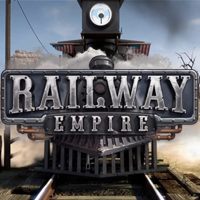Railway Empire: How to make money?
Last update:
Making money is a crucial aspect of the gameplay, and thus you will need good rail networks (especially at the beginning) to have a steady income. Obviously, you won't be able to afford too many train stations, train connections, and locomotives at the beginning of your adventure. It's a good idea to establish a rail network that can connect several cities/production sites. This way, a single train can visit many places and remain fully loaded. What's the best way to make money?
- Passengers and mail
- Goods and resources
- Use additional personnel and railcars to maximize your income
- Factories, shares and random events
Passengers and mail
Trains carrying express goods can transport passengers and mail. It's a great way to make money during the first stage of the gameplay, but your income depends on your speed and distance between cities. The further and faster you transport your passengers, the more you will earn. The income in the scenarios taking place in the early 1800s will not be that great, due to poor quality locomotives. Transportation of passengers is quite easy, as you only need to find out where they want to go (if you decide to "blindly" establish connections between cities, you will often get your income anyways). It's important that you build separate connections for such trains, so that other trains will not block them or slow them down on their way. Speed is a crucial factor here.

First of all, look for nearby cities. If you want your wagons to remain full all the time, one of the cities needs to be of medium size at least (level 2 or 3). Furthermore, you should purchase the fastest train available (any train will do at the beginning) with a high level of comfort. And last but not least, try to build a connection on a flat terrain, and with as little turns, railway signaling, and other obstacles as possible. This may be challenging at first, so you should look for appropriate cities near your first train station. Later on, you will be able to afford simple connections, tunnels, and bridges.
Adjust rail network options, and set a high priority for passengers and mail, or allow for transportation of express goods only. This way, the train will not attach any freight wagons that can slow it down. Furthermore, when it comes to train formation, you should select a locomotive to deal with mixed or express cars. Freight locomotives have different parameters and would not reach their full potential.
You can increase your income by hiring additional personnel (engineers and stokers will increase the speed of your trains, while conductors and security guards will increase your income) and attach special railcars (e.g. dining car). You may want to check whether it's better to invest in a train formation of passenger cars (8 railcars), or attach special railcars (e.g. 7 passenger cars + 1 special railcar). Sometimes, the difference will be barely visible and it's better to transport more passengers (it makes the cities grow). If you have the fastest locomotive in a given scenario, and it reaches its goal in a record time, the train will receive a special status and earn you even more money.
Goods and resources
Transportation of resources, consumer goods, and industrial goods is what keeps your business running. Cities will need these goods to grow, which will eventually allow you to improve the range of your services and your income. Keep in mind that the income does not depend on distance or speed - you will always receive the same amount of money. However, cities will have different needs for specific goods. The demand for goods will increase when a city grows. Every 5.000 inhabitants will let you deliver a new product to a given location.
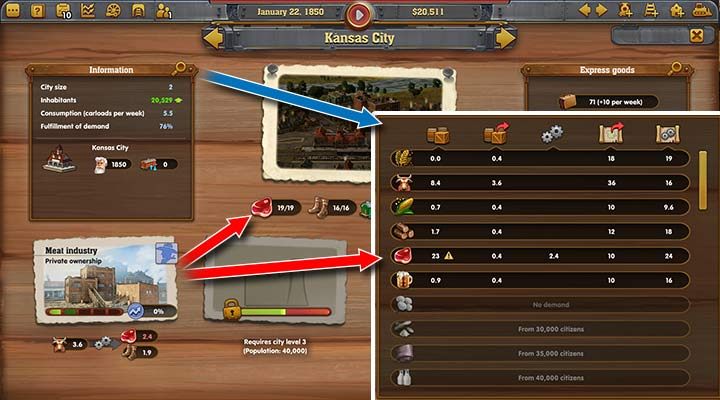
Once you satisfy the demand for a given product, a city will not take any more supplies. On one hand, the closer a given business is located, the faster you will deliver the goods and receive your payment. On the other hand, you will satisfy needs quickly and you may have to wait a while before citizens ask for more supplies (and thus you will earn less or at a lower speed). To avoid that, you should assign one railway line to transport resources to the appropriate factories (e.g. wheat to make beer), and a second one to distribute goods (e.g. beer) to other cities. This way, the city will always have demand for wheat. In case of this specific resource - it's very useful because it will be consumed by citizens and used by the factory (brewery).
Before you transport any resources, check nearby cities. Some of them will be used immediately by the city (e.g. wheat, corn or wood). This way, you will quickly earn money and contribute to city development. If several industries can satisfy needs of a given city, you should connect two or three such businesses and transport resources in turns. It's especially important in case of small towns, as demand will be small at the beginning. Your railcars will always be full and you will have the highest income. Eventually, cities will grow and you may have to prepare separate train formations for different resources.
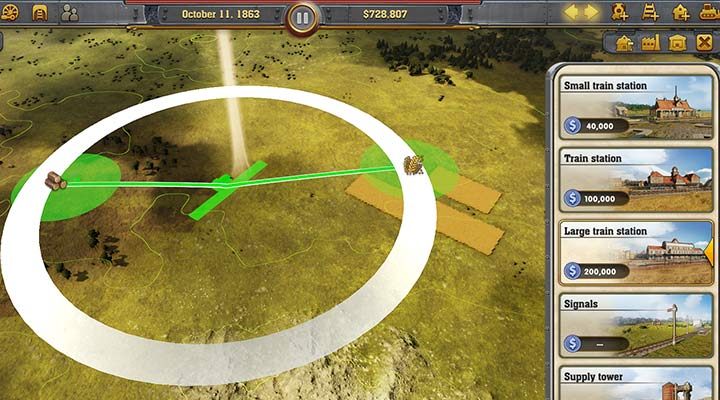
If the largest train stations (they cost $200.000 and have 4 platforms) are able to reach more than one business, you should build those. Your train will automatically load the right amount of resources from one station, according to the current demand. E.g. if one business is closer to the city, and the other one is located further, you can build railway tracks in a straight line, and your train will visit each train station one by one. This way, your train will gather requested goods automatically and keep empty railcars for other train stations (only some railcars will be loaded on the first train station if you need resources from the second one as well).
You will earn more money for delivering goods than resources. These are all the products manufactured in factories located in cities. They will usually require only one component, but later factories will need more than one type of material. Goods are used by cities. You earn money for delivering resources to factories and transporting goods (e.g. beer and meat) to other cities. Goods manufactured and used in the same city give you no profit. However, prices of goods are higher than prices of resources. If there are no large cities, you won't earn too much (little demand for goods) and growing cities will increase your income. It's a good idea to start with delivering goods and resources to a different city via the same train. You will save some money at first, but you will need to change your approach once your rail network becomes larger.
Use additional personnel and railcars to maximize your income
There are certain ways to maximize your income. You can use the personnel and special railcars to achieve that.
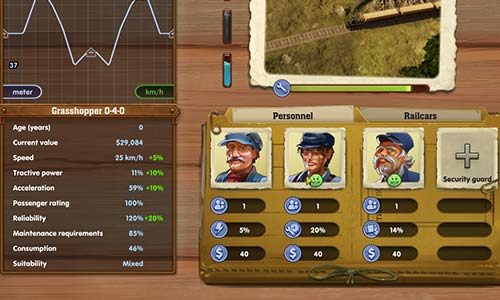
Each train can hire workers on four different positions. Railway conductors are important in passenger trains and they will increase income from express goods (passengers and mail). Security guards will also increase your income and improve safety (important when you e.g. advertise your rail network). On the other hand, stokers and engineers do not affect your income directly, but your trains will be able to travel faster and longer, without you having to repair them. If your employees get along (green relationship arrows), they will receive further bonuses. Your employees charge you for joining your company and receive a monthly salary.
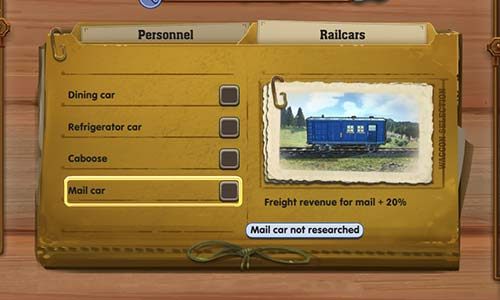
Special railcars can increase your profit from passengers, mail or food products. It's worth adding such a railcar to your train formation, especially when levels of production and demand are low. This way, you will extend your train formation and slightly increase your income. The last available railcar is responsible for productivity improvement of your trains, and thus you will use its full potential when your train reaches maximum load capacity. On the other hand, a special railcar will take place of another railcar that could have been loaded with some goods or resources. Keep in mind that attaching special railcars is not always the most lucrative solution and you shouldn't add them to every single train you have.
Factories, shares and random events
Apart from transporting goods and passengers, there are other ways to make money. These are additional sources of income, as the profit depends on establishing rail networks and delivering goods.
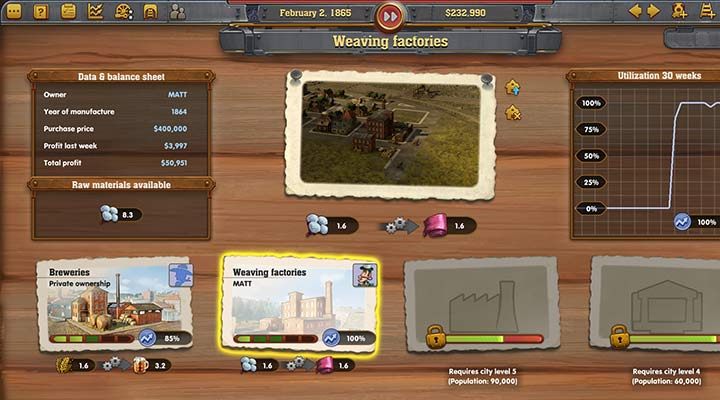
Purchasing factories and manufactories: every business can be bought, but only factories can be built directly. Auctions will occur from time to time, and if a certain facility is not doing too well, the owner may ask you for help. When that happens, you can often purchase the facility for a discount price. Besides, building your own factory is cheaper than purchasing an existing one. In both cases, transport is a very important factor. Manufactories (farms, mines etc.) make money when you distribute their products, while factories are profitable when you bring raw materials and transport crafted goods. It's good to buy factories, whenever they are being worked (not necessarily by you). If you or any of your competitors use e.g. a brewery, bring wheat, and distribute beer to nearby cities, such factories will always be profitable.
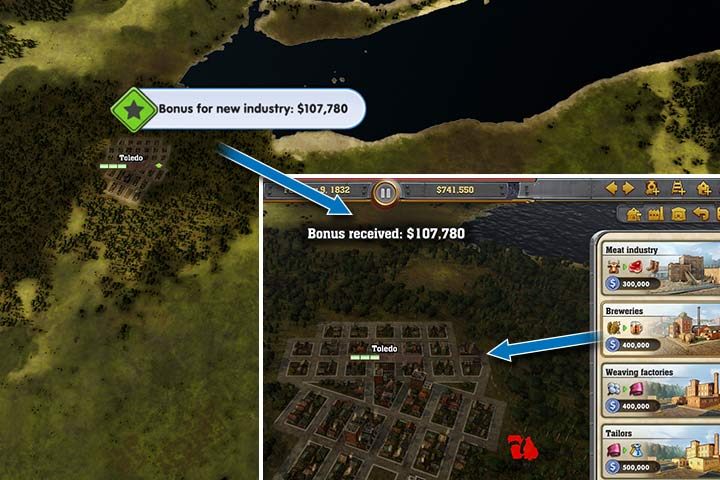
Random events are usually financial bonuses that you receive for connecting a city or a business to your rail network, or building a factory. Such bonuses are available for a very short time and involve little money. However, they will reimburse (at least partially) your expenses, and you will create a new market outlet.
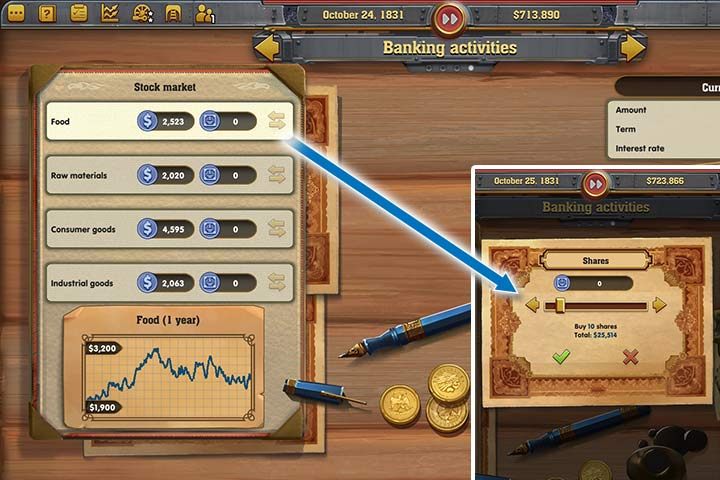
Consider shares as investment in a given sector of the economy. You can buy as many shares as you want and sell them whenever you decide to. It's a long-term investment, as you earn money by selling your shares when the prices go up. The current situation on the map will affect that. If you are planning to transport a lot of agricultural products and preparations, buy shares from the food branch. After some time, their value will go up and you will be able to sell your shares to gain profit. It's not the best way to earn money, as it still depends on the rail network, and you don't get paid right away.
You are not permitted to copy any image, text or info from this page. This site is not associated with and/or endorsed by the developers and the publishers. All logos and images are copyrighted by their respective owners.
Copyright © 2000 - 2026 Webedia Polska SA for gamepressure.com, unofficial game guides, walkthroughs, secrets, game tips, maps & strategies for top games.
